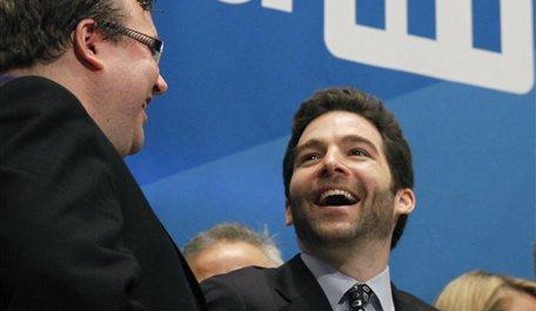CBS headlined this interview “Sanford: Moving on from GOP naysayers,” but Mark Sanford actually doesn’t have a lot to say about fellow Republicans in his post-victory interview. Instead, Sanford says his election demonstrates the South Carolina tradition of forgiveness and redemption, and that he expects few problems from colleagues now that he has won the seat:
Sanford told NBC that he’ll have “plenty of friends in Washington”:
Visit NBCNews.com for breaking news, world news, and news about the economy
Former South Carolina Gov. Mark Sanford may have been ridiculed by Democrats and largely abandoned by his own Republican party, but he insisted Wednesday that he’ll find people to work with when he heads back to Capitol Hill.
“I’ll have plenty of friends in Washington, D.C.,” the newly elected congressman told TODAY’s Matt Lauer.
“I look forward to working, whether its Republicans, Democrats, Independents — you name it, a whole host of different folks in terms of trying to accomplish things that better people’s lives here in the first congressional district and frankly turn the tide with regard to spending up in Washington, D.C.”
But should he? Jonah Goldberg wrote at length about this today, noting that demand for moral leadership in politics doesn’t appear to match up well with supply:
And it’s worth noting that what has changed the most isn’t the supply of moral politicians, but the demand for them. Ambitious, selfish, amoral men have always been attracted to politics. At least in terms of his sex life, John F. Kennedy was a disgusting man who, among other things, pimped out an intern. Other presidents, Republican and Democrat, cheated on their wives, too. Such behavior is not new. But that was all kept from the public eye — by the press, by the establishment, etc – in part because it was understood that if the public found out, the politician’s career would be over. Times have changed and the public doesn’t demand — or demand sufficiently — either the myth or the reality of morality anymore.
I think it’s fair to say that conservatives still care more than liberals about maintaining the old standards. And that creates a real dilemma. In an era of moral lassitude, how much do you insist on moral propriety in politics? Since sin and temptation are bipartisan phenomena, should conservatives be at a constant disadvantage? I don’t think there are easy answers there, or at least I can’t think of what they might be. Asking Republicans to vote for Colbert-Busch in order to punish Mark Sanford strikes me as a hard sell. Why support the party you disagree with politically just to punish a man you agree with politically? Colbert-Busch — whose political hero, of course, was John F. Kennedy – wouldn’t even answer directly whether she would vote for Nancy Pelosi as speaker. On matters of political integrity, it seems to me, Sanford was hardly the clear worse choice.
But one thing I really resent is the tendency of liberals to demand that conservatives stick to standards that liberals reject entirely. If you have no brief against the Clintons, the Weiners, the Spitzers, or the Kennedys please don’t pretend you’re offended by the Sanfords. Indeed, when Democratic politicians get caught in scandals, the response from liberals is invariably, Why can’t you conservatives lighten up? Who are you to judge? Etc. It is only when conservatives are caught in such messes, that liberals walk over to the conservative side, pick up our standards, and beat us up with them. Any talk of lightening-up or forgiveness is immediately denounced.
It’s absolutely true that conservatives need to wrestle with the question of what we should expect from our politicians. But I’m not sure liberals have anything worth listening to on the subject.
Perhaps it’s not even really that complicated. We’d certainly prefer to have our politicians exemplify moral ideals, but in the end that’s not their job. Their job is to put in place the most beneficial policies and enforce the law, and in the end, that’s what voters prioritize. Once Sanford won the primary — where voters could have imposed a moral penalty on Sanford — the general election came down to a choice on policy, and the heavily Republican district made the rational choice in that paradigm.








Join the conversation as a VIP Member